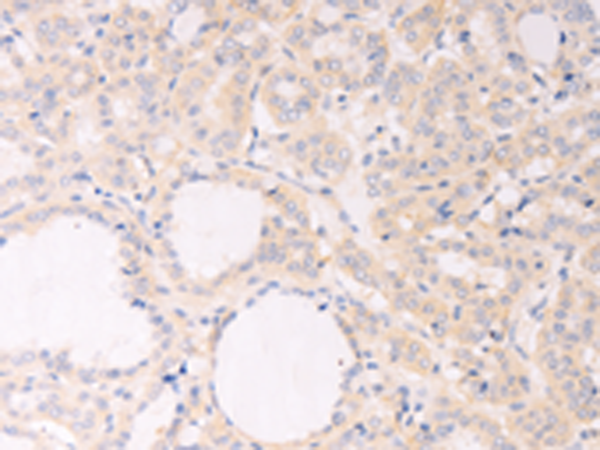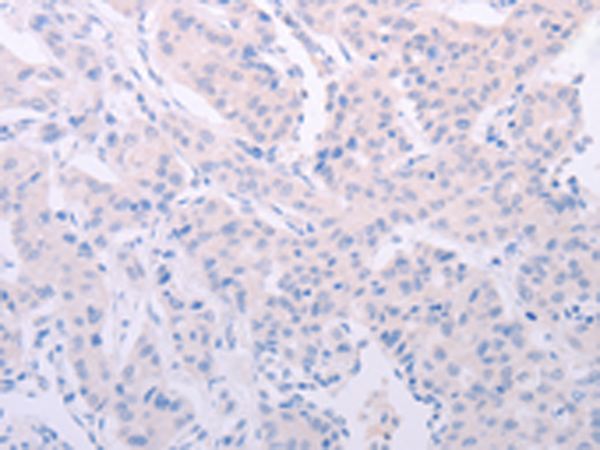

| WB | 1/1000-1/5000 | Human,Mouse,Rat |
| IF | 咨询技术 | Human,Mouse,Rat |
| IHC | 1/20-1/100 | Human,Mouse,Rat |
| ICC | 技术咨询 | Human,Mouse,Rat |
| FCM | 咨询技术 | Human,Mouse,Rat |
| Elisa | 1/2000-1/10000 | Human,Mouse,Rat |
| Aliases | SPCA |
| Host/Isotype | Rabbit IgG |
| Antibody Type | Primary antibody |
| Storage | Store at 4°C short term. Aliquot and store at -20°C long term. Avoid freeze/thaw cycles. |
| Species Reactivity | Human |
| Immunogen | Fusion protein of human F7 |
| Formulation | Purified antibody in PBS with 0.05% sodium azide and 50% glycerol. |
+ +
以下是关于RNF20抗体的3篇参考文献及其摘要概括:
---
1. **"The histone H2B-specific ubiquitin ligase RNF20 links chromatin dynamics to tumor suppression"**
*Shema, E., et al. (2008). Nature.*
摘要:研究利用RNF20抗体揭示RNF20通过催化组蛋白H2B的单泛素化(H2Bub1)调控染色质结构和基因转录,并证明其作为肿瘤抑制因子的功能。RNF20缺失促进细胞转化和肿瘤发生,与H2Bub1水平降低相关。
2. **"RNF20 suppresses tumor progression through β-catenin degradation in a ubiquitination-dependent manner"**
*Kim, J., et al. (2011). Genes & Development.*
摘要:通过RNF20抗体实验发现,RNF20通过泛素化降解β-catenin抑制Wnt信号通路,从而抑制结直肠癌进展。研究强调RNF20在维持基因组稳定性和抑制肿瘤中的作用。
3. **"RNF20 regulates the biological response to DNA damage by promoting H2B ubiquitination"**
*Takahashi, Y.H., et al. (2011). Nucleic Acids Research.*
摘要:利用RNF20抗体证实RNF20在DNA损伤修复中的关键作用,通过H2B泛素化招募修复因子(如BRCA1)至损伤位点。RNF20缺失导致DNA修复缺陷和基因组不稳定性。
4. **"The E3 ubiquitin ligase RNF20 interacts with the histone chaperone FACT to modulate virus replication"**
*Datta, P.K., et al. (2010). Journal of Biological Chemistry.*
摘要:研究使用RNF20抗体发现,RNF20与组蛋白伴侣FACT相互作用,调控病毒(如HSV-1)复制。RNF20通过H2B泛素化影响病毒基因组的染色质重塑,抑制病毒增殖。
---
这些研究均通过RNF20抗体验证其功能,涵盖肿瘤抑制、DNA修复及病毒调控等领域。如需具体文献DOI或页码,可进一步补充数据库检索关键词(如PubMed ID)。
The RNF20 antibody is a crucial tool for studying the RNF20 protein, a key component of the E3 ubiquitin ligase complex (composed of RNF20 and RNF40) that catalyzes the monoubiquitination of histone H2B at lysine 120 (H2Bub1). This post-translational modification plays a vital role in transcriptional regulation, DNA damage repair, and chromatin remodeling. RNF20 antibodies are widely used in molecular biology research to detect RNF20 expression levels, subcellular localization, and interactions in various experimental models, including Western blotting (WB), immunohistochemistry (IHC), and immunoprecipitation (IP).
Altered RNF20 activity has been implicated in cancer progression, as it acts as a tumor suppressor by regulating oncogene expression and genome stability. Studies show that RNF20 downregulation correlates with poor prognosis in cancers like breast, lung, and colorectal cancer. The antibody helps investigate its role in epigenetic regulation, particularly in modulating chromatin structure during transcription elongation.
Commercial RNF20 antibodies are typically raised against specific epitopes, such as the N-terminal or C-terminal regions, and validated for species reactivity (human, mouse, rat). Researchers rely on these antibodies to explore RNF20’s interplay with other factors like PAF1 complex or its response to DNA-damaging agents. Validating antibody specificity via knockout controls is essential due to potential cross-reactivity with homologous proteins like RNF40. Overall, RNF20 antibodies are indispensable for dissecting its biological functions and therapeutic potential in disease contexts.
×